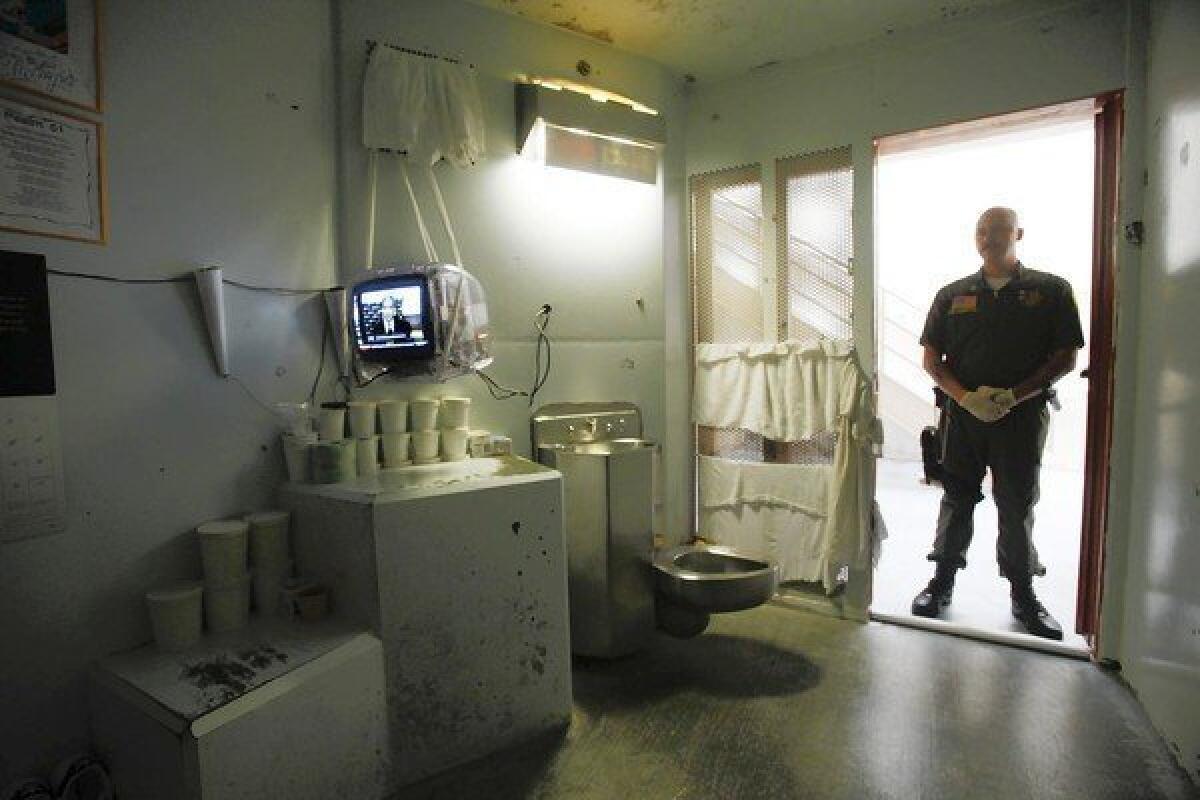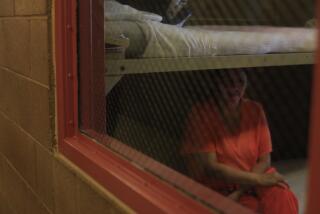Inmates end California prison hunger strike

- Share via
SACRAMENTO — Inmates leading California’s largest prison protest ended a two-month hunger strike Thursday without winning major concessions on solitary confinement conditions — their main grievance — but with the promise of legislative hearings on the issue.
The strike, which began with 30,000 inmates refusing meals and ended with about 100, drew international attention to California’s use of prolonged prisoner isolation. It was orchestrated by a few inmates in isolation at Pelican Bay prison near the Oregon border.
By this week, nearly 10 protesters a day were collapsing or otherwise required medical care. On Thursday, prison medical workers sought to move four of the most frail to medical wards, but those inmates refused to go, an official said.
Meanwhile, inmate leaders, even as they agreed to resume eating, said they had merely “suspended” their protest.
“Our goal remains: Force the powers that be to end their torture policies and practices in which serious physical and psychological harm is inflicted on tens of thousands of prisoners, as well as our loved ones outside,” protest leaders said in a statement released by former state Sen. Tom Hayden, who said he had advised inmates’ lawyers on strategy.
Prison officials have insisted that their solitary confinement policies, revised after a series of smaller hunger strikes in 2011, are non-negotiable. But advocates for the inmates said the state had nevertheless agreed to discuss changes in how inmates are housed in those conditions — whether they should be allowed to have drinking cups or typewriters, for example.
“It may seem small, but … it does have a little impact in the quality of their lives,” said attorney Anne Weills, who is representing Pelican Bay prisoners in a federal lawsuit alleging that prolonged solitary confinement is torture.
Corrections officials declined to talk about the details of such discussions.
The strike triggered an announcement last week that lawmakers who oversee prison policy would hold public hearings this fall on conditions in California’s maximum security prisons. Corrections officials say segregation units in those lockups are needed to control prison gangs responsible for violence and crime.
The legislators have vowed that their hearings would result in proposals for policy changes. Meanwhile, inmates and their lawyers are pursuing two federal lawsuits challenging California’s isolation policies.
The courts are the better forum for that debate, said criminal justice expert Barry Krisberg at UC Berkeley’s law school. “Ultimately, it will take a clear court definition of what is constitutional,” Krisberg said. “Legislatures don’t like to get involved in that.”
The inmates seek limits on how long prisoners can be held in isolation — five years, according to one of their demand letters. They also want elimination of the promise that prisoners can escape that environment by informing against others in confinement. The prisoners and their advocates have argued that the process results in fabricated claims.
The decision to call off the hunger strike unfolded in a rare meeting Wednesday of inmates who have spent years — for some, decades — in isolation.
After learning that legislative hearings would be held, Weills said, the four leaders of the strike asked guards to permit them to meet with 14 other organizers. The organizers, representing four main ethnic and racial groups in California prisons, assembled in the Pelican Bay law library.
They “talked about why the strike should end and the accomplishments they’d made, the willingness [of lawmakers] to have the hearings,” said Weills, who was present. “They voted to end the strike there.”
Afterward, the inmates were allowed to call other protest leaders who had been moved, along with most of the remaining hunger strikers, to California State Prison in Folsom, she said.
Though corrections officials said all hunger strikers have agreed to begin eating again, the danger to their health is not over. A sudden influx of calories can cause fatal effects in a person who has been fasting for a long time.
“Right now is the critical time for our medical staff to ensure the process of reintroducing inmates to normal food,” said Joyce Hayhoe, representing the court-appointed agency that runs prison healthcare.
Hayhoe said hunger strikers will be closely monitored as they gradually increase their food intake over the next week, and some will be moved to medical beds for that process. The medical office last month began emptying its hospital units to make room.
“We’ve been planning for this day now for several weeks,” Hayhoe said.
Legislators said they would take up where the hunger strike left off as early as October, when Sen. Loni Hancock (D-Berkeley) and Assemblyman Tom Ammiano (D-San Francisco) plan to seek testimony on the use of solitary confinement. Both have made clear that they consider the practice overused.
“Our real work begins now,” Ammiano said in an interview, “as we will soon start preparing for hearings that I hope can bring an end to the disgraceful conditions that triggered the hunger strike.”
In a statement filed in federal court last week, a prison expert said that almost 9% of California’s prison population is held in isolation, almost double the rate of other states. The expert, sociologist James Austin, reported that almost 10,600 inmates are in various types of segregation cells.
Prisoners remain in those cells nearly 23 hours a day, have limited contact with others, and are allowed few possessions and little outside food. A special monitor for the United Nations and Roman Catholic bishops in California have called on the state to curtail the time prisoners are kept in such conditions.
The United Nations’ expert on torture has said the limit should be 15 days.
Times staff writer Chris Megerian contributed to this report.
More to Read
Sign up for Essential California
The most important California stories and recommendations in your inbox every morning.
You may occasionally receive promotional content from the Los Angeles Times.











